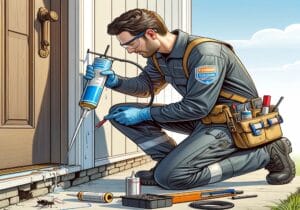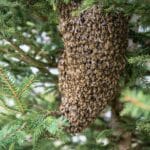Spiders might be great for the ecosystem, but let’s face it, you don’t want them setting up shop in your home. Whether it’s their webs you’re walking into or the spiders themselves that give you the heebie-jeebies, I’m here to help you keep those eight-legged freeloaders at bay. So, roll up your sleeves and let’s get to work with some straightforward, effective tips and tricks.
Key Takeaways
- Conduct thorough inspections both inside and outside your home to identify potential spider habitats and entry points.
- Seal up any cracks or gaps in your home’s exterior to prevent spiders from getting inside.
- Keep your home clean and clutter-free to reduce hiding spots for spiders.
- Use natural repellents like essential oils to deter spiders without resorting to chemicals.
- If spider infestations persist, consider calling in professional pest control for expert assistance.
Identify and Eliminate Attractive Spider Habitats
First things first, let’s cut off the problem at the source. Spiders love quiet, undisturbed nooks and crannies. This could be anything from piles of wood next to your home, to that stack of boxes in the attic you haven’t touched in years.
- Regularly inspect your home for these cozy spider retreats, especially in garages, sheds, and basements.
- Clear away any debris or vegetation that’s right up against your house—this is prime real estate for spiders looking to relocate indoors.
- Keep an eye out for any signs of spider activity, like webs or egg sacs, and remove them promptly.
Seal the Deal: Fortify Your Home Against Eight-Legged Invaders
Spiders can squeeze through tiny gaps you might overlook. So, your next step is to seal up your home like Fort Knox. Pay attention to window frames, doorways, and foundation cracks.
- Use caulk to seal any cracks and crevices on the outside of your home.
- Install or repair screens on windows and vents to keep spiders out while still letting in fresh air.
- Fit door sweeps to close the gap between the bottom of your doors and the floor.
Regular Cleaning: Your First Line of Defense
A clean home is your first line of defense against spider infestations. Dust and vacuum regularly to remove spiders, webs, and egg sacs. Don’t forget to hit those often-neglected spots like under furniture and in corners where spiders like to hang out.
And here’s a tip: when you’re cleaning, don’t just relocate the spiders—take them outside. It might be a hassle, but it’s better than having them set up their webs again the next day.
Natural Repellents: Deterrents That Do the Trick
Before you reach for the insecticide, consider this: there are plenty of natural spider repellents you can use that are safe for you, your family, and your pets.
- Essential oils like peppermint, tea tree, and eucalyptus can be mixed with water and sprayed around the house to deter spiders.
- Vinegar is also an effective spider repellent. Mix equal parts vinegar and water in a spray bottle and use it in the same way as the essential oil mixture.
- Citrus peels can be rubbed along skirting boards and window sills to keep spiders at bay.
Remember, consistency is key. You’ll need to reapply these natural repellents regularly to maintain their effectiveness.
Making Your Home Inhospitable to Spiders
It’s not just about kicking spiders out; it’s about making your home a place they’d rather avoid. Spiders are attracted to areas where they can hide and hunt, so let’s turn their paradise into a no-go zone.
Addressing Moisture Issues
Spiders love damp environments because they attract other pests that serve as their food. Check for leaky pipes, condensation, or any other sources of excess moisture. Fixing these issues will make your home less appealing to spiders and their prey.
Landscaping Practices That Discourage Spider Settlement
Your garden might be unintentionally inviting spiders. Keep shrubbery trimmed and away from your home’s exterior. Woodpiles and compost heaps should be kept at a distance, as they are perfect hideouts for spiders.
Proper Storage Techniques to Prevent Spider Hideouts
Inside, make sure to store items in sealed containers rather than cardboard boxes, which can attract spiders. Keeping your storage areas tidy and off the ground will also discourage spiders from settling in.
Fortification Strategies: Keeping Spiders Outside
Even with the best cleaning and decluttering efforts, spiders can find their way inside. That’s where fortification comes in—creating physical barriers to entry.
Crack and Crevice Treatment
Inspect the exterior of your home for any small openings. Use a quality silicone-based caulk to seal up those entry points. This includes areas where utility lines enter your home.
Window Screens and Door Sweeps
Make sure all your windows have screens in good repair. Door sweeps are an inexpensive and effective way to block the gap under doors, which is a common entry point for spiders.
Exterior Surface Treatments and Repairs
Don’t forget the outside of your home. Repair any damaged siding, loose shingles, or gaps in the trim. This not only keeps spiders out but also improves your home’s overall appearance and value. For more effective natural pest control strategies, consider additional preventative measures.
Cleaning Routines to Keep Spiders at Bay
A clean home is less inviting to all pests, including spiders. Regular dusting and vacuuming can remove existing spiders and discourage others from moving in. For more pest-proofing tips, check out our comprehensive guide.
Eradicating Webs and Egg Sacs
When you see webs, get rid of them. Use a vacuum with a hose attachment to suck up webs and egg sacs. If you do this regularly, spiders will get the message that your home isn’t a good place to settle.
Declutter: Reducing Spider-Conducive Environments
Clutter provides hiding spots for spiders. Go through your home and get rid of things you don’t need. Organize what’s left so there are fewer places for spiders to hide.
Maintaining Clean and Organized Storage Areas
Storage areas are often spider havens. Keep these areas as clean and organized as possible. Use plastic storage bins with tight-fitting lids instead of cardboard boxes.
Natural and Chemical-Free Spider Deterrents
If you’re looking for ways to keep spiders away without using harsh chemicals, there are several natural alternatives that can help.
Benefits of Essential Oils and Vinegar Solutions
Essential oils like peppermint, tea tree, and lavender are not only pleasant for us, they’re a natural deterrent for spiders. Mix a few drops with water in a spray bottle and mist areas where spiders frequent. Vinegar, too, can be used in a similar fashion, though its smell is more pungent and may not be as pleasant.
For example, mixing a teaspoon of peppermint oil with a quart of water creates a refreshing and effective spider repellent spray.
Leveraging Plant Power: Companion Planting for Spider Control
Some plants naturally repel spiders with their scent. Consider planting these around your home:
- Eucalyptus
- Lavender
- Mint
- Lemon balm
Not only will these plants help deter spiders, they can also add beauty and fragrance to your garden.
Diatomaceous Earth: An Eco-Friendly Spider Barrier
Diatomaceous earth is a natural, non-toxic powder that can be sprinkled in areas where spiders might enter your home. It’s safe for humans and pets but lethal to spiders and other small insects.
When to Call the Pros: Seeking Professional Pest Control
Now, you’ve done all you can to make your home a spider-free zone, but sometimes the spiders are stubborn, or there’s a larger issue at hand. This is when you might need to call in the pros. Pest control professionals have the tools and expertise to handle infestations efficiently.
Evaluating Your Situation: DIY vs. Professional Help

Consider the scale of your spider problem. A few spiders here and there can typically be managed on your own. However, if you’re seeing spiders regularly, or you’re finding poisonous varieties, it’s time to call in the experts. They can help identify the species of spider and the extent of the infestation, then develop a plan to get rid of them safely and prevent them from coming back.
Understanding Professional Pest Control Methods
- Inspection: Professionals will thoroughly assess your home to identify the type of spiders and the severity of the infestation.
- Treatment: They may use a variety of methods, including sprays, dusts, and baits, to eliminate spiders.
- Prevention: Experts will also offer advice and services to prevent future infestations, which may include sealing up entry points and ongoing monitoring.
Professionals have access to more potent treatments that are not available over the counter. They also understand how to use these treatments safely to avoid harm to humans or pets.
Making Informed Decisions: Choosing the Right Pest Control Service
When selecting a pest control service, look for licensed, experienced professionals with positive reviews. Ask about their treatment methods and ensure they have a clear plan to address your specific spider problem. A good service provider will also offer a guarantee for their work, providing peace of mind that the spiders will be dealt with effectively.
Tying It All Together: Ongoing Prevention is Key
Ultimately, the best way to deal with spiders is to prevent them from entering your home in the first place. By following the steps outlined in this guide, you’ll make your home less inviting to spiders and reduce the chances of an infestation. Remember, ongoing vigilance is essential. Regular cleaning, maintenance, and monitoring will help keep your home spider-free.
Frequently Asked Questions
How Often Should I Clean to Prevent Spider Infestation?
Maintain a regular cleaning schedule, at least once a week, to keep spiders at bay. Pay special attention to corners, under furniture, and other out-of-the-way places where spiders like to hide. If you live in an area with a lot of spiders, you may need to clean more frequently. For more detailed information, check out these effective tips for controlling house spiders.
What are the Common Entry Points for Spiders?
Spiders can enter your home through windows, doors, cracks, and gaps in the exterior. They can also hitch a ride on items brought into the house. Regularly inspect and seal potential entry points to keep them out.
Are There Any Risks in Using Chemical Deterrents?
Chemical deterrents can be effective, but they may pose risks to humans, pets, and the environment if not used correctly. Always follow the manufacturer’s instructions and consider using natural alternatives when possible.
Can Certain Plants Actually Repel Spiders?
Yes, some plants, such as eucalyptus, lavender, and mint, have been known to repel spiders with their scent. Planting them around your home can help keep spiders away.
When Should I Definitely Call Professional Pest Controllers?
If you’re dealing with a large infestation, seeing spiders frequently, or finding dangerous species like black widows or brown recluses, it’s time to call the pros. They can provide a safe and effective solution to your spider problem.











